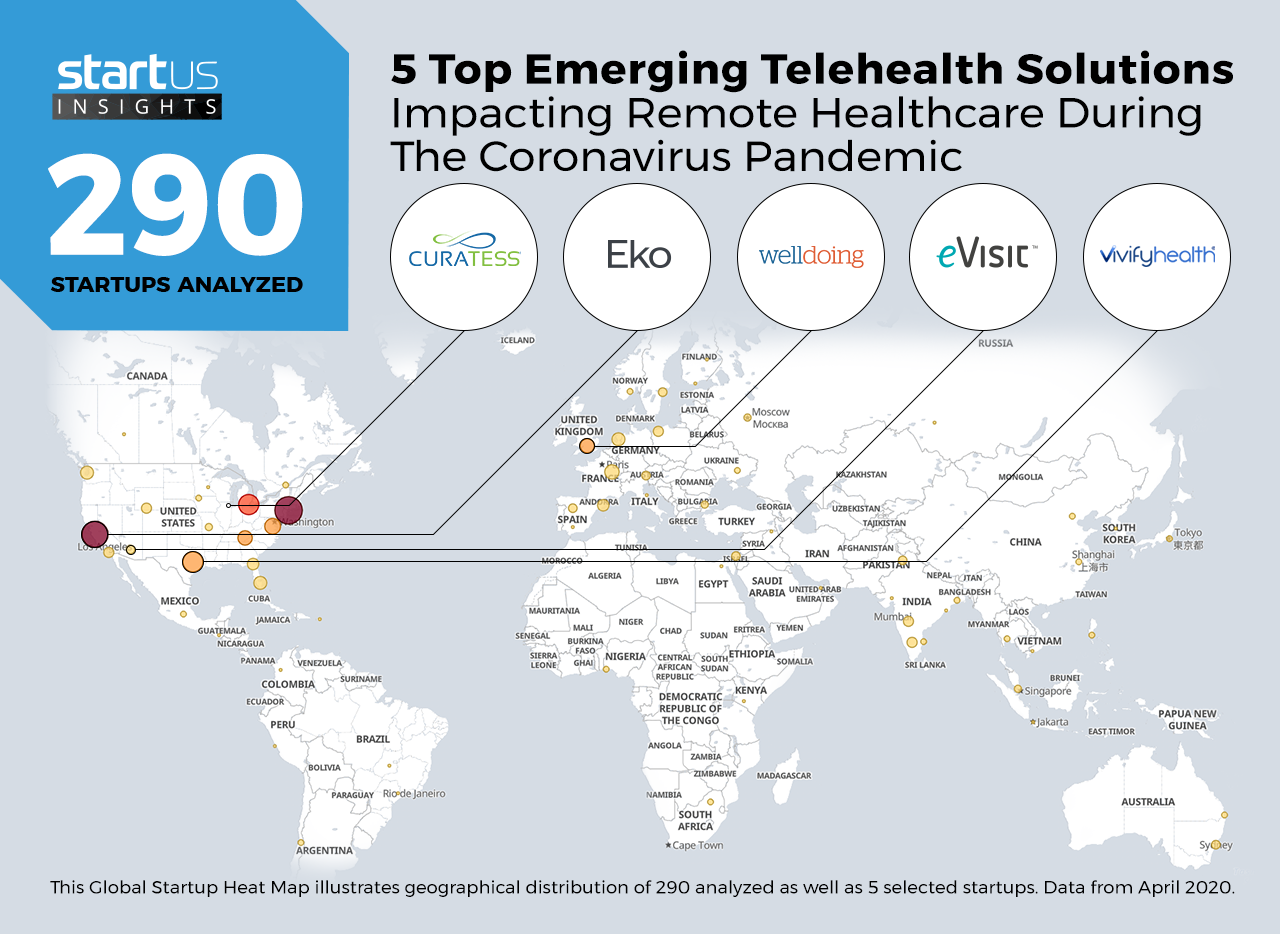Our Innovation Analysts recently looked into emerging technologies and up-and-coming startups & companies working on telehealth solutions to mitigate the effects of the coronavirus pandemic.
Heat Map: 5 Top Telehealth Solutions
We use a data-driven startup scouting approach to identify the most relevant solutions globally. The Global Startup Heat Map below highlights 5 interesting examples out of 290 relevant solutions. Curatess, eVisit, Eko, Vivify Health, and Welldoing, develop 5 top solutions to watch out for!
Curatess – Remote Care Platform
Telehealth solutions help reduce the spread of the coronavirus while ensuring that patients receive adequate care and advice. Remote care platforms integrate with existing clinical workflows, enable audio and video calls with patients, and also use it to communicate with other team members.
The US-based startup Curatess creates a HIPAA-compliant remote care management platform that allows patients to remotely visit doctors via high-definition audio and video calls. Curatess integrates with FDA-approved Bluetooth devices, including a stethoscope, enabling physicians to listen to respiratory and cardiac sounds remotely, in diagnostic quality. The platform integrates with electronic health records (EHR) and does not require specialized hardware.
Eko – Remote Auscultation & Cardiac Screening
From small clinics to large hospitals, telemedicine devices such as digital stethoscopes reduce medical teams’ exposure to COVID-19. ECG devices for remote cardiac monitoring are very useful as they allow patients to be auscultated remotely. As a result, this ensures that people with cardiovascular diseases – who are at a higher risk – stay at home.
Eko, a company from the USA, builds DUO, an FDA-approved combination of an electronic stethoscope and a handheld ECG. The stethoscope, Eko CORE, provides high-fidelity lung auscultation to detect sounds associated with pneumonia or acute respiratory distress syndrome (ARDS), one of the most recurring complications of COVID-19. In addition, DUO enables real-time transmission of sounds from the lungs, heart, and ECG.
Welldoing – Virtual Therapists
Prevention measures mandated by many governments, such as self-isolation, social distancing, and remote work are stressful for many people. Some people feel depressed because of the lack of communication, while others feel anxious about the risk of getting infected. A virtual therapist platform is a telehealth solution that helps to solve the before-mentioned problems of mental wellbeing by connecting patients with certified therapists for virtual consultations.
The British company Welldoing provides a therapist matching service for in-person and online therapy. The therapists on this platform offer patients their help to cope with stress, anxiety, depression, relationship problems, and grief. This is potentially useful in countries with a higher number of deaths from COVID-19, where quarantine rules still remain. The platform also offers patients a personalized matching service, helping them connect with suitable therapists for their problems.
eVisit – Virtual Medical Consultation
Telemedicine platforms give patients the ability to visit doctors online. This helps limit both their and medical teams’ exposure to SARS-CoV-2. Such platforms employ workflow optimization to enable physicians to attend to more patients, which is especially important right now. As the number of patients with COVID-19 rises, startups and emerging companies rapidly develop easy-to-use remote consultation solutions.
The US-based startup eVisit offers VirtualED, a coronavirus-specific workflow configuration of their telehealth platform. The platform enables doctors to conduct virtual screenings for COVID-19, as well as treat non-emergency patients at home. Besides a two-way video that enables virtual consultations with doctors, the platform also includes the virtual waiting room, access to family accounts and a live chat.
Vivify Health – Remote Monitoring Platform
Remote patient monitoring platforms allow doctors to continuously track their patients’ health parameters, such as heart rate, respiratory rate, oxygen saturation, breathing patterns, and body temperature. Remote healthcare platforms thereby reduce the number of non-urgent hospital visits and limit both patients and medical staff from possible exposure to the novel coronavirus.
Vivify Health, a company based in the US, works on a remote patient monitoring platform that recently developed a new Coronavirus Pathway. This allows patients to conduct self-screening for COVID-19 symptoms remotely, by answering relevant questions. After self-screening, the platform provides instructions on what to do next. The information also appears in the Vivify portal so the physician can proactively reach out to the patient if needed. Vivify Health distributes the Pathway for free among health providers that use the company’s remote monitoring platform.
How To Flatten The Curve?
This is an unprecedented situation for many of us across the world. The SARS outbreak in the early 2000s claimed 774 lives. That toll was enough to drive research & development and easier healthcare solutions. The fact that several mobile health, e-health, remote health, hospital care, and diagnostics startups and companies are able to respond during a real epidemic is encouraging. With thousands of deaths already, we expect to see numerous new companies offering technology-driven solutions to help doctors, nurses, other health workers, and the larger public.









